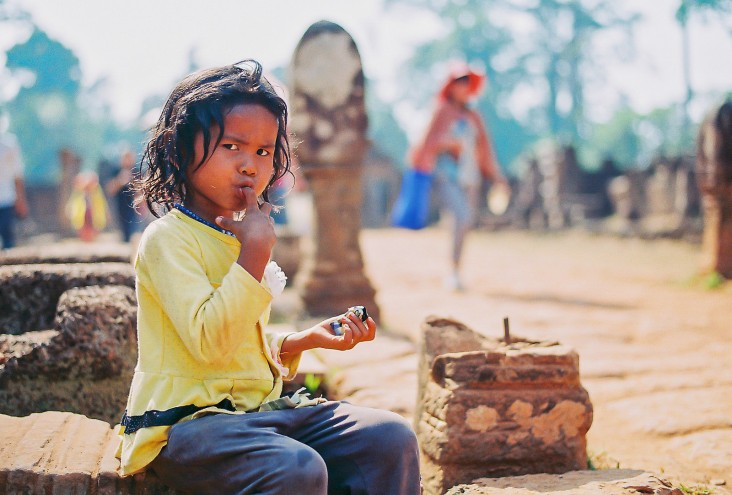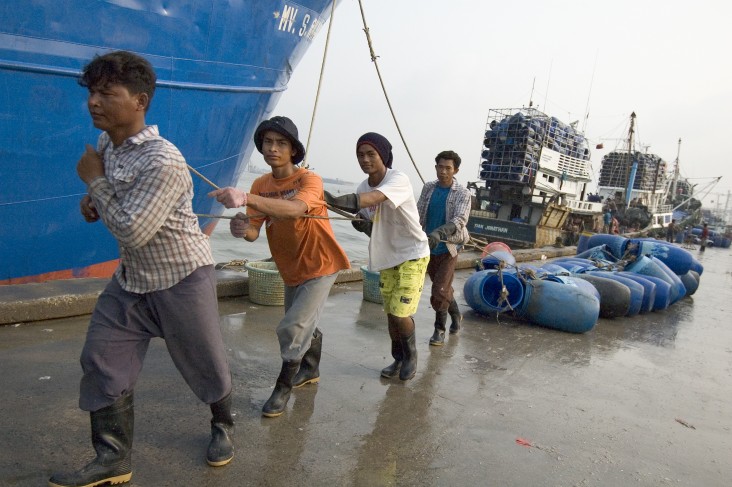- What We Do
- Agriculture and Food Security
- Democracy, Human Rights and Governance
- Democracy, Human Rights and Governance Strategy
- Supporting Free and Fair Elections
- Supporting Vibrant Civil Society & Independent Media
- Protecting Human Rights
- Promoting Accountability & Transparency
- Importance of Democracy, Human Rights, & Governance to Development
- Countering Trafficking in Persons
- Economic Growth and Trade
- Education
- Ending Extreme Poverty
- Environment and Global Climate Change
- Gender Equality and Women's Empowerment
- Global Health
- Water and Sanitation
- Working in Crises and Conflict
- U.S. Global Development Lab

Trafficking in Persons (TIP) is a global human rights challenge that preys upon the vulnerable, breaks down rule of law, and corrupts global commerce. It involves the recruitment, transportation, transfer, harboring, or receipt of persons through the use of force, fraud, or coercion for the purposes of exploitation in forced labor or commercial sexual exploitation. According to the International Labor Organization, there are an estimated 20.9 million forced labor/human trafficking victims globally.
USAID has supported Counter-Trafficking in Persons (C-TIP) programs in over 68 countries and regions since 2001. USAID has endeavored to engage in innovative, private sector partnership approaches to C-TIP under the Supply Unchained Initiative - particularly to better identify and counter human trafficking in the fishing industry. USAID’s C-TIP approach follows the 4Ps: Prevention of trafficking through awareness-raising and addressing root causes, Protection of victims and survivors, Prosecution of traffickers by building government law enforcement capacity, and Partnership building for a strengthened response.
In 2012, USAID launched a Counter-Trafficking in Persons (C-TIP) Policy [PDF, 344K] to reinvigorate and further focus the agency’s C-TIP efforts. The policy emphasizes five key objectives:
- Integration of C-TIP activities into broader development programs
- Rigorous research on C-TIP programming through surveys and impact evaluations
- Institutional accountability within USAID to combat trafficking
- Investments in critical trafficking challenge countries
- Increase C-TIP activities in conflict and crisis-affected areas
We’re also holding ourselves accountable. In 2012, USAID adopted a C-TIP Code of Conduct [PDF, 141K] that prohibits all employees from engaging in trafficking in persons or any behaviors that may facilitate trafficking, such as commercial sex. In addition, all Agency employees are required to take counter-trafficking training. USAID also developed a set of standard operating procedures to prevent and respond to human trafficking abuses by USAID contractors, sub-contractors, assistance recipients, and sub-recipients. In 2013, USAID published a C-TIP Field Guide [PDF, 1.2MB] to educate Mission personnel and partners about human trafficking, and provide technical assistance to integrate, design, implement, and monitor effective programs.
Human trafficking is a fundamental obstacle to our mission as a development agency and undermines the development objectives we hope to accomplish through our programming. Human trafficking impedes health, economic growth, rule of law, women’s empowerment, and lifetime prospects for youth. USAID is one of a number of U.S. government departments and agencies tasked with implementing C-TIP activities. The President’s Interagency Task Force to Monitor and Combat Trafficking (PITF) is a Cabinet-level entity created by the Trafficking Victims Protection Act of 2000 (TVPA) to coordinate federal efforts to combat trafficking in persons. The PITF meets annually and is chaired by the Secretary of State.
As part of this effort the Agency highlighted the following achievements in select countries in 2016:

- In Moldova and Bosnia & Herzegovina, USAID helped develop a cadre of professional judicial and prosecutorial officers in order to build the capacity of the justice sector to address C-TIP cases. For example working with Moldova’s National Institute of Justice, USAID provided specialized training in national and international standards for investigating and classifying TIP for forced labor providing these officers with the knowledge and skills for investigating and adjudicating cases of human trafficking for labor exploitation. In Bosnia & Herzegovina, USAID helped anti-trafficking institutions adopt and implement more effective policies, laws, and regulations as well as enabling the Ministry of Security to complete research on the magnitude, nature, and roots of trafficking to conduct TIP awareness campaigns.
- In Egypt, USAID supported the process to draft a National Strategy and Action Plan to combat trafficking and irregular migration, in addition to training 145 justice officials and civil society organizations’ members.
- In Ukraine, USAID continued to build the capacity of select NGOs and Government personnel for the improvement to identification, referral and assistance to victims of TIP. Results included the development of the first National Referral Mechanism, an inter-governmental assistance effort to support victims of TIP. USAID also supported the provision of sustainable assistance and reintegration of victims of TIP by identifying economic empowerment opportunities. Notably, more than 3,000 representatives of local state administrations, state social services, NGOs, and other stakeholders were trained on the identification, referral, and assistance to victims of TIP. USAID continued to support the operation of the National Toll-Free Counter-Trafficking and Migrant Advice Hotline and assisted over 10,000 callers.
- In Asia, USAID’s regional platform focused on improving the victim support provisions of the ASEAN (Association of Southeast Asian Nations) Convention, and to adopt a rights-based approach to the care for victims of TIP and at-risk populations. Particular attention was devoted in the Convention to supporting victims with protection, shelter, counseling, basic health care, legal support, and eventually administrative support for repatriation to their countries of origin.
- In Guatemala, USAID provided training, technical assistance, and case management monitoring to the Specialized Trafficking in Persons Prosecutor’s Office in efforts to support the Government of Guatemala for the implementation of the Law Against Sexual Violence, Exploitation and Trafficking in Persons.
- In response to the Nepal’s earthquake, USAID’s C-TIP efforts were expanded to offer protection services to earthquake-affected communities, including: (i) economic and preventive support to build resilient communities empowered to combat trafficking and gender-based violence; and (ii) support to mitigate protection risks and vulnerabilities for women and marginalized populations through community-based psychosocial support. Examples of the project’s results are: strengthening 250 Safe Migration Networks in six districts to be effective advocates and resource persons on trafficking, gender-based violence, and safe labor migration, and establishing 17 new Village Committees to Combat Human Trafficking in two districts that border India.
- In Madagascar, USAID programming worked to improve national coordination on human trafficking, increase awareness, strengthen victims’ protection, and improve coordination with destination countries. Key achievements included the development and release of the National Action Plan to Combat Trafficking in Persons in March 2015; the establishment of the Anti-Human Trafficking National Bureau; and the launch of an inter-agency working group for a coordinated TIP approach including coherent advocacy and messaging to national stakeholders.
- In Senegal, USAID supported work in partnership with two Dakar municipalities to reduce the incidence of forced begging while improving the educational and health outcomes for talibés (young boys studying the Koran, who are forced to beg for food and money to pay their teachers). Due in part to USAID’s efforts, the target municipalities saw a reduction in talibés’ time spent begging in the streets from an average 10 hours per day to an average of four hours per day, and detected a reduction in the number of talibés from 660 to approximately 230.
- In Bangladesh, USAID’s C-TIP activity supported a behavioral change campaign to build awareness on trafficking and safe migration among populations vulnerable to trafficking. The campaign reached over 1,670,000 people across all districts of Bangladesh through a variety of communication platforms.
Resources
Counter-Trafficking in Persons Policy [PDF, 344K]
Fact Sheet Summarizing the C-TIP Policy [PDF, 234K]
Executive Order on Strengthening Protections Against TIP in Federal Contracts
State Department's Trafficking in Persons Report 2015
Promising Practices: A Review of U.S. Government-funded Anti-Trafficking in Persons Programs [PDF, 322K]
Video: Counter-Trafficking in Persons app and hotline
Video: The Giant Ocean Case: Challenges in Securing Justice for Exploited Fishermen
Blog: Looking Down Supply Chains to Counter Human Trafficking
Blog: A Spotlight on the World’s Invisible Workers
Blog: A New Tool for Retail Giants to ‘Target’ Child Trafficking
Blog: Some Days I Lived, Other Days I Died. Resilience in the face of exploitation
Blog: Human Trafficking and Migration in Central Asia: Two Tales of Ordeal







Comment
Make a general inquiry or suggest an improvement.